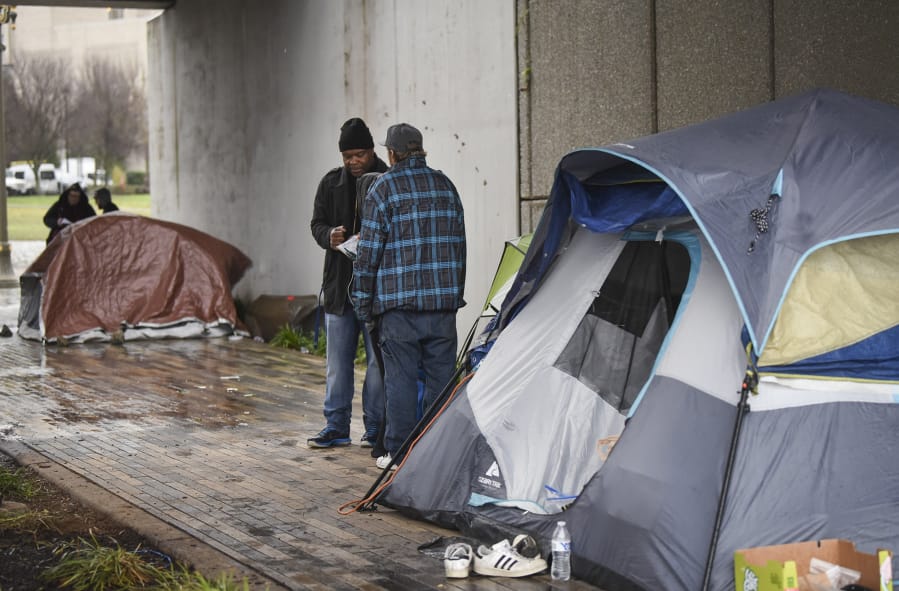Tucked underneath railway overpasses, some of Vancouver’s most vulnerable make camp.
Several tents speckle the sidewalks on Esther and Grant streets, sheltered from rain, sun and passers-by. But waterfront construction — the same construction that likely displaced many who previously called the waterfront home — is attracting more foot traffic which could be an issue as visiting crowds grow.
Tyler Chavers, a Vancouver police officer, said despite the growing number of sidewalk campers under the overpasses, complaints are at a minimum. There was one troublesome camp earlier this year, but the situation was resolved when one person was arrested in an assault incident.
“Based on the sheer volume of people that I know daily get through there even when kind of the worst of the worst camping was going on, I was surprised there weren’t more complaints,” Chavers said.
A 2015 city ordinance allows camping on sidewalks, but only between the hours of 9:30 p.m. and 6:30 a.m.
City staff and police go out several times a month and tag tents in violation of the code. If the tents are still there the next day, police ask those campers to leave. If the site is abandoned, city staff pack up the belongings and take them to storage for future retrieval.
Campers who refuse to leave are issued a citation.
Chavers said at the overpasses near the waterfront, most people move without issue.
“It consumes a lot of my time,” he said. “And I’ve worked with many of the homeless folks to get their property back.”
There was some discussion among city staff as to how Vancouver should handle campers moving forward. Maybe different rules are needed. But Chad Eiken, Vancouver’s community and economic development director, said the city ultimately plans to stick to just enforcing the existing ordinance. It’s possible the ordinance will change at some point.
In November, the Vancouver City Council discussed a few amendments to the rule including a diversion program for violators. This would mean residents who receive citations for unlawful camping could connect with service providers instead of the current fine and potential jail time. The issue has not been discussed at city council since then.
Limited resources
Eiken said nothing is set in stone, but the city has started reaching out to organizations such as Portland’s Central City Concern to form a partnership in order to more efficiently handle code enforcement.
“It seems to be the limiting factor really is having staff from our operations department that could be available sort of on an as-needed basis,” Eiken said. “But because our staff is busy paving and repairing water and sewer, we don’t have that resource on hand.”
This would allow police to respond more on an as-needed basis instead of relying on routine area checks to keep campers from blocking pedestrian walkways.
“That would definitely help,” Eiken said. “It would allow us to mobilize a little more quickly.”
In theory, he’d like to see a response within an hour.
But as with many ideas, funding is an issue. The Affordable Housing Fund provides funding for homeless prevention, but couldn’t be used for code enforcement related to homeless people camping on the street.
Having a more responsive team to collect belongings when needed is the first step, Eiken added. He’d like to see a team on standby that includes mental health providers and case workers to respond to campers during routine sweeps. But that’s a long-term concept.
“I’d say we’re light years ahead of where we were three years ago but we still have a long way to go,” Chavers said.




